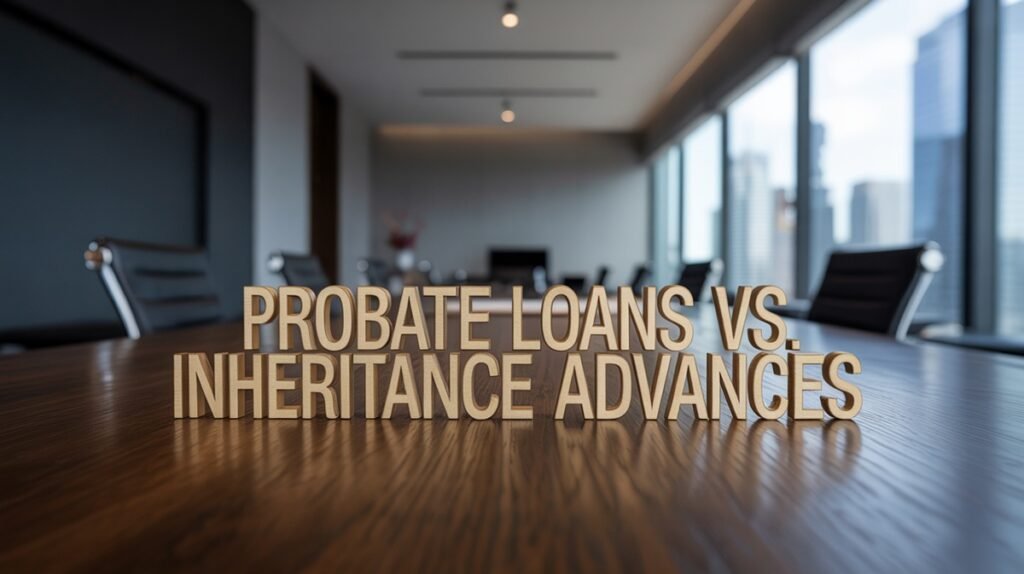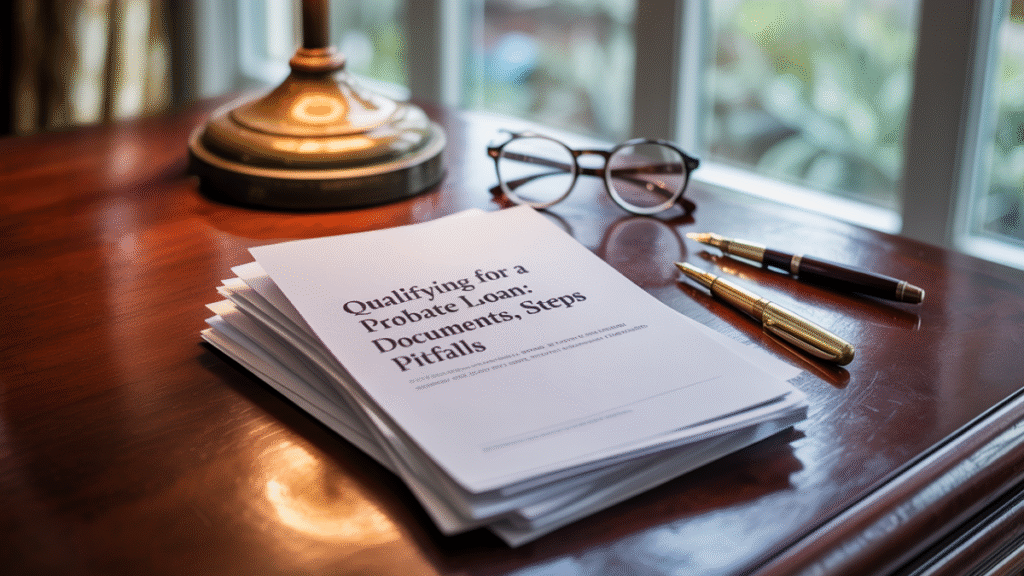| Feature | Inheritance Advance | Loan |
| Repayment | Taken from estate at probate close | Monthly payments until paid off |
| Interest Rate | No traditional interest, but high effective cost | Fixed or variable interest rate |
| Credit Check | Not required | Usually required |
| Ownership Impact | Reduces inheritance amount | No effect on inheritance |
| Speed of Funds | Days to weeks | Varies, often days if approved |
💰 Probate Isn’t Free
Court costs, appraisals, attorney fees — they add up fast.
Estimate your total out-of-pocket costs before you get surprised.
→ Calculate Your Probate Fees
What Is an Inheritance Advance?
An inheritance advance lets you access a portion of your expected inheritance before the probate process is completed. It’s not a loan—you’re essentially selling part of your future inheritance to a company in exchange for quick cash.
- How it works: You apply with a company, provide details about your inheritance, and they confirm this information with the estate executor.
- The agreement: Once approved, you sign a contract and receive a lump sum upfront. The company later collects its share directly from the estate when probate closes.
- Main difference from loans: There are no monthly repayments, but you will end up with less than your original inheritance share.
When an Inheritance Advance Makes Sense
There are situations where taking an advance could be a reasonable choice.
- Probate delays: If probate is expected to take a long time, an advance gives you earlier access to funds.
- Urgent financial needs: Medical bills, foreclosure prevention, or other emergencies can make quick access to money critical.
- No other funding sources: If bad credit or no collateral stops you from getting a loan, an advance might be your only choice.
If your needs aren’t urgent and you can afford to wait, it’s usually better to receive the full inheritance to avoid high costs.
How Much Does It Really Cost?
The cost of an inheritance advance is calculated differently from a traditional loan. Companies typically take a larger portion of your inheritance than the cash you receive upfront.
- Example: If you’re set to inherit $50,000 and take an advance of $20,000, the company might collect $30,000 from your share when the estate is distributed.
- Effective cost: This means you paid $10,000 for early access, and in many cases, you could be giving up 30%–50% of that portion’s value.
Key takeaway: The shorter the probate process, the higher your effective cost will be for the advance.
The Risks of Inheritance Advances
- Loss of value: You will receive less than the actual worth of the inheritance you assign.
- Estate value misjudgment: If the estate ends up being smaller than estimated, your loss could be even greater because the company’s share is fixed in the agreement.
- Family or legal disputes: Taking an advance can create tensions with other heirs or even lead to legal challenges.
Alternatives to Inheritance Advances
Before committing to an advance, it’s worth exploring other financial options.
- Personal loan or line of credit: These might offer lower costs and allow you to keep your full inheritance.
- Borrow from family or friends: This can be interest-free with mutually agreed terms.
- Partial estate distribution: In some cases, the executor can release part of your share early.
- Sell personal assets: This allows you to raise funds without reducing your inheritance.
How to Avoid Getting Ripped Off
If you decide to move forward with an advance, take steps to protect your finances.
- Compare offers: Get quotes from multiple companies to find the most favorable terms.
- Review the fine print: Fully understand the fees, repayment conditions, and any other charges.
- Ask about non-recourse terms: This means you won’t owe extra if the estate’s value is lower than expected.
- Get legal advice: Have a probate or estate lawyer review the contract before signing.
Questions to Ask Before You Commit
Asking the right questions helps you dodge surprises down the line.
- How much will I receive upfront compared to my total inheritance?
- What fees or deductions will be taken?
- What happens if probate is delayed?
- How will this arrangement affect other heirs?
- What if the estate is worth less than expected?
Conclusion
An inheritance advance can be a quick way to get cash during the often slow probate process, but it’s rarely the cheapest option. You’ll almost always give up a significant portion of your inheritance for the convenience of early payment. The smarter move is to explore other financial avenues first, such as personal loans, family assistance, or partial estate distributions.
If you choose to take an advance, make sure you work with a trustworthy company, fully understand the contract, and consider getting legal guidance. This way, you’ll know exactly what you’re agreeing to and can avoid losing more than you expect.
Key takeaway: Inheritance advances can solve short-term financial problems, but they come with high costs. Always compare your options and understand the trade-offs before committing.
FAQs
Are inheritance advances taxable?
Inheritance advances usually aren’t considered taxable income, but tax laws vary. It’s best to check with a tax professional for advice on your situation.
Can I get an advance before probate starts?
Generally, no. Most companies require probate to be underway to confirm your legal right to the inheritance.
Does an inheritance advance affect other heirs?
It can, depending on the estate’s value and how assets are distributed. Sometimes, it may indirectly affect the timing or size of what others receive.
What happens if the estate is smaller than expected?
With a non-recourse agreement, you won’t owe the difference. Without it, the company may still collect the full agreed amount.
Can I change my mind after taking the advance?
Once the contract is signed and the funds are released, it’s usually final unless the company offers a short cancellation window.



